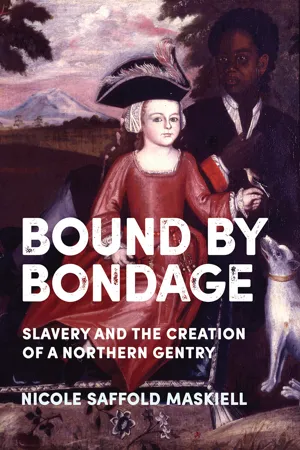
New Netherland Institute Studies
Slavery and the Creation of a Northern Gentry
- 288 pages
- English
- ePUB (mobile friendly)
- Available on iOS & Android
New Netherland Institute Studies
Slavery and the Creation of a Northern Gentry
About This Book
During the first generations of European settlement in North America, a number of interconnected Northeastern families carved out private empires. In Bound by Bondage, Nicole Saffold Maskiell argues that slavery was a crucial component to the rise and enduring influence of this emergent aristocracy. Dynastic families built prestige based on shared notions of mastery, establishing sprawling manorial estates and securing cross-colonial landholdings and trading networks that stretched from the Northeast to the South, the Caribbean, and beyond. The members of this elite class were mayors, governors, senators, judges, and presidents, and they were also some of the largest slaveholders in the North. Aspirations to power and status, grounded in the political economy of human servitude, ameliorated ethnic and religious rivalries, and united once antagonistic Anglo and Dutch families, ensuring that Dutch networks endured throughout the English and then Revolutionary periods. Using original research drawn from archives across several continents in multiple languages, Maskiell expertly traces the origin of these private familial empires back to the founding generations of the Northeastern colonies and follows their growth to the eve of the American Revolutionary War. Maskiell reveals a multiracial Early America, where enslaved traders, woodsmen, millers, maids, bakers, and groomsmen developed expansive networks of their own that challenged the power of the elites, helping in escapes, in trade, and in simple camaraderie. In Bound by Bondage, Maskiell writes a new chapter in the history of early North America and connects developing Northern networks of merit to the invidious institution of slavery.
Frequently asked questions
Information
Table of contents
- Acknowledgments
- Introduction: Manhunt
- 1 Neger: Race, Slavery, and Status in the Dutch Northeast (1640s–60s)
- 2. Kolonist: Slaveholding and the Survival of Expansive Anglo-Dutch Elite Networks (1650s–90s)
- 3. Naam: Race, Family, and Connection on the Borderlands (1680s–90s)
- 4. Bond: Forging an Anglo-Dutch Slaveholding Northeast (1690s–1710s)
- 5. Family: Kinship, Ambition, and Fear in a Time of Rebellions (1710s–20s)
- 6. Market: Creating Kinship-Based Empires United by Slaveholding (1730s–50s)
- 7. Identity: Navigating Racial Expectations to Escape Slavery (1750s–60s)
- Conclusion: Gentry
- Appendices
- Abbreviations
- Notes
- Bibliography
- Index